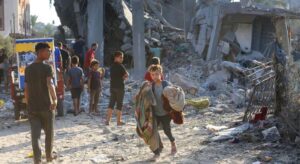
The United States criticized this Monday (1) the measure adopted by Israel to censor the broadcaster TV Al Jazeera. Hours earlier, Israeli lawmakers had approved a law that paves the way to ban international media outlets considered a threat to national security from operating in the country.
“We believe in freedom of the press. It’s critical. It is critically important, and the United States supports the critically important work that journalists do around the world, and that includes those reporting on the conflict in Gaza,” said White House spokeswoman Karine Jean-Pierre.
After Prime Minister Benjamin Netanyahu promised to take immediate action to force the end of operations of the Qatar-based news channel, parliament approved authorization for government ministers to decide to end the broadcast of foreign news networks.
Netanyahu confirmed the decision on social media. “A Al Jazeera will no longer be broadcast from Israel,” Netanyahu wrote in a post on X after the law was passed. “I intend to immediately act in accordance with the new law to stop channel activity.”
In addition to the US, the Committee to Protect Journalists (CPJ) said the approved law gives Netanyahu’s government “authority to close down any foreign media outlet operating in Israel, posing a significant threat to international media.”
“This contributes to a climate of self-censorship and hostility toward the press, a trend that has intensified since the start of the Israel-Gaza war,” CPJ said.
A TV Al Jazeera is considered one of the largest and most credible news broadcasters in the world. Its coverage often gives voice to the Arab point of view on the conflict, as well as critics of the Israeli massacre in the Gaza Strip.
Internal pressure
While trying to silence criticism in the press, Netanyahu is dealing with internal dissatisfaction. This Monday, crowds formed in West Jerusalem, in front of Parliament, the Knesset, calling for new elections.
Images show hundreds of tents set up on the street in front of the Knesset in what is the second of a four-day protest, according to organizers. On the first day, Saturday, 16 people were detained.
Protesters demand Netanyahu’s departure for failing to act to release Israeli hostages captured by Hamas on October 7.
“No more killing, no more despair, the hostages are the most important thing,” said the protesters.
Context
The current Israeli massacre in the Gaza Strip — or military operation, as Israel calls it — began in October last year, but conditions in the Palestinian territory were already considered “suffocating” by the UN before that.
The 17-year Israeli blockade — to force Hamas, the party that won the Palestinian elections in 2006, to give up power — generated unemployment rates of 45% and food insecurity that affected 64% of the population. The UN estimated that more than 80% of Gaza residents depended on foreign aid to survive.
On October 7, members of Hamas entered Israel and carried out the most violent attack ever suffered by the country, leaving around 1,200 dead and capturing 240 hostages. The Netanyahu government’s response was considered disproportionate by the international community. Daily bombings in what is considered one of the most densely populated territories in the world have caused the deaths of tens of thousands of Palestinians and destroyed the entire infrastructure of Gaza.
The number of fatalities exceeded 32 thousand Palestinians — around 70% women and children —, with more than 8 thousand people missing under the rubble. 35% of the buildings were destroyed and practically all of the more than two million inhabitants were forced to leave their homes.
In the other occupied Palestinian territory, the West Bank, illegal violence carried out by Israeli settlers is daily, with more than 500 deaths. Since the start of the conflict, thousands of Palestinians have been arrested and the government has announced that thousands more will be detained this year.
The UN warns of a humanitarian disaster, accusing Israel of using collective hunger as a weapon of war and highlighting the real possibility that hundreds of thousands of Palestinians will die due to lack of food.
Editing: Matheus Alves de Almeida

Source: www.brasildefato.com.br

